
Filter News
Area of Research
- (-) Supercomputing (313)
- (-) Transportation Systems (11)
- Advanced Manufacturing (34)
- Biological Systems (18)
- Biology and Environment (179)
- Biology and Soft Matter (5)
- Building Technologies (12)
- Chemical and Engineering Materials (4)
- Chemistry and Physics at Interfaces (11)
- Clean Energy (525)
- Climate and Environmental Systems (14)
- Computational Biology (6)
- Computational Chemistry (5)
- Computational Engineering (5)
- Computer Science (19)
- Data (1)
- Earth Sciences (1)
- Electricity and Smart Grid (3)
- Energy Frontier Research Centers (14)
- Energy Sciences (5)
- Fossil Energy (3)
- Fuel Cycle Science and Technology (3)
- Functional Materials for Energy (16)
- Fusion and Fission (55)
- Fusion Energy (19)
- Geographic Information Science and Technology (3)
- Isotope Development and Production (3)
- Isotopes (36)
- Materials (434)
- Materials Characterization (2)
- Materials for Computing (36)
- Materials Synthesis from Atoms to Systems (13)
- Materials Under Extremes (12)
- Mathematics (1)
- National Security (81)
- Neutron Data Analysis and Visualization (4)
- Neutron Science (192)
- Nuclear Science and Technology (74)
- Nuclear Systems Modeling, Simulation and Validation (3)
- Nuclear Systems Technology (1)
- Quantum Condensed Matter (4)
- Quantum information Science (9)
- Reactor Technology (1)
- Renewable Energy (4)
- Sensors and Controls (5)
News Type
News Topics
- 3-D Printing/Advanced Manufacturing (5)
- Advanced Reactors (1)
- Artificial Intelligence (36)
- Big Data (20)
- Bioenergy (9)
- Biology (11)
- Biomedical (17)
- Biotechnology (2)
- Buildings (4)
- Chemical Sciences (5)
- Climate Change (17)
- Computer Science (95)
- Coronavirus (14)
- Critical Materials (3)
- Cybersecurity (8)
- Decarbonization (6)
- Energy Storage (8)
- Environment (21)
- Exascale Computing (24)
- Frontier (29)
- Fusion (1)
- Grid (5)
- High-Performance Computing (40)
- Isotopes (2)
- Machine Learning (14)
- Materials (15)
- Materials Science (17)
- Mathematics (1)
- Microscopy (7)
- Molten Salt (1)
- Nanotechnology (11)
- National Security (8)
- Net Zero (1)
- Neutron Science (13)
- Nuclear Energy (4)
- Partnerships (1)
- Physics (8)
- Polymers (2)
- Quantum Computing (19)
- Quantum Science (24)
- Security (5)
- Simulation (15)
- Software (1)
- Space Exploration (3)
- Summit (43)
- Sustainable Energy (10)
- Transportation (8)
Media Contacts
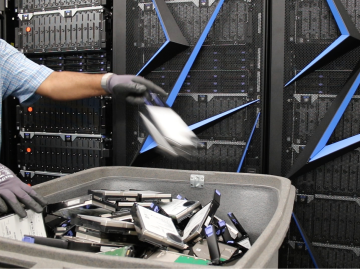
The Summit supercomputer, once the world’s most powerful, is set to be decommissioned by the end of 2024 to make way for the next-generation supercomputer. Over the summer, crews began dismantling Summit’s Alpine storage system, shredding over 40,000 hard drives with the help of ShredPro Secure, a local East Tennessee business. This partnership not only reduced costs and sped up the process but also established a more efficient and secure method for decommissioning large-scale computing systems in the future.

Nuclear physicists at the Department of Energy’s Oak Ridge National Laboratory recently used Frontier, the world’s most powerful supercomputer, to calculate the magnetic properties of calcium-48’s atomic nucleus.
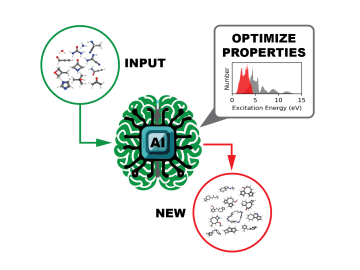
A team of computational scientists at ORNL has generated and released datasets of unprecedented scale that provide the ultraviolet visible spectral properties of over 10 million organic molecules.

Research performed by a team, including scientists from ORNL and Argonne National Laboratory, has resulted in a Best Paper Award at the 19th IEEE International Conference on eScience.
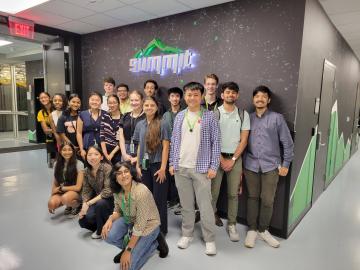
This summer, ORNL welcomed more than 500 students to campus through the lab’s range of internship programs, which are offered in areas such as biology, national security and computing.

Researchers from institutions including ORNL have created a new method for statistically analyzing climate models that projects future conditions with more fidelity.

Hilda Klasky, a research scientist in ORNL’s Computing and Computational Sciences Directorate, has been named a fellow of the American Medical Informatics Association.
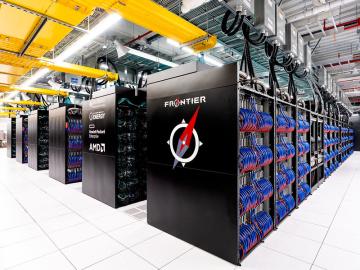
ORNL has joined a global consortium of scientists from federal laboratories, research institutes, academia and industry to address the challenges of building large-scale artificial intelligence systems and advancing trustworthy and reliable AI for

Scientists at ORNL used their knowledge of complex ecosystem processes, energy systems, human dynamics, computational science and Earth-scale modeling to inform the nation’s latest National Climate Assessment, which draws attention to vulnerabilities and resilience opportunities in every region of the country.
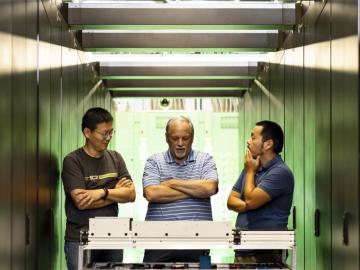
The team that built Frontier set out to break the exascale barrier, but the supercomputer’s record-breaking didn’t stop there.


